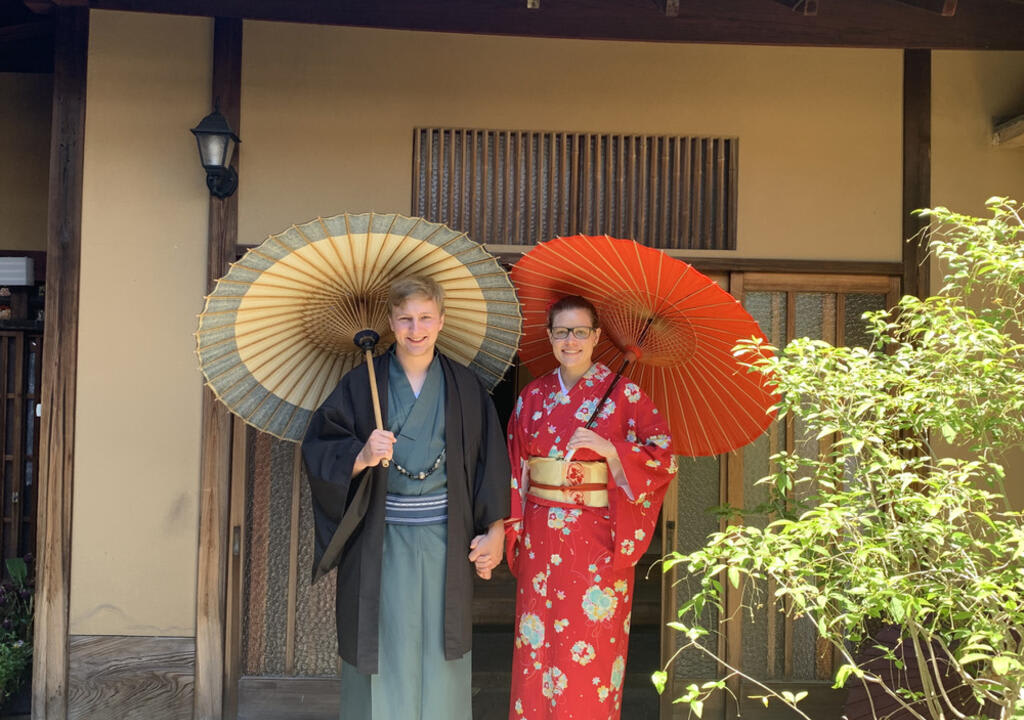How to teach English in Japan: the easiest way
Find out the best way to teach English in Japan, why you should do it and how to make the most of this experience.
7min

Embarking on a journey to teach English in Japan is not just about sharing language skills. It's an immersive dive into the deep sea of Japanese culture, traditions, and customs.
Your role as an English teacher can serve as your gateway to experiencing this unique society from within. You'll be partaking in traditional festivities, learning Japanese expressions, and getting familiar with their way of life firsthand.
But how do you go about it? And what does teaching English in Japan entail? You’ll find out all about it in this article!
Reasons for teaching English in Japan
Teaching English in Japan offers an unparalleled blend of personal growth, cultural immersion, and the chance to make a positive impact. It's not just about imparting knowledge; it's also about learning from your surroundings.
Still not convinced? Here are some reasons to teach English in Japan:
Diving into Japanese culture
The experience of working or volunteering in Japan allows you to fully immerse yourself within their culture. You'll get firsthand exposure to traditional customs, festivals, and mouth-watering Japanese food. This isn't simply sightseeing - it's living life as locals do.

Making a positive impact
In a society where mastering foreign languages is highly esteemed like Japan's, your role as an English teacher holds immense value. You're contributing towards empowering individuals with language skills, which can be game changers both personally and professionally.
Working on your self-growth
Living abroad offers many opportunities for personal growth. Adapting to new environments presents challenges that help build resilience and enhance problem-solving abilities - qualities invaluable throughout one's lifetime.
Boosting your Japanese language skills
Diving into the heart of Japan means immersing yourself in its rich language. Improving your Japanese language skills is not only a professional asset, but it also amplifies your personal experience by allowing deeper engagement with local people and culture.

Requirements for teaching English in Japan
If you want to teach English in Japan as a paid teacher in regular schools, you’ll usually have to fill in some requirements, such as:
- A TEFL certification (Teaching English as a Foreign Language);
- A relevant educational degree;
- A work visa, that can be obtained via sponsorship employer.
If you don’t have these qualifications, but want to teach English in Japan nonetheless, don’t worry. Volunteering abroad platforms like Worldpackers offer opportunities without strict stipulations, which is what we’ll focus on in this article.

How to teach English in Japan
The idea of teaching English in Japan may seem overwhelming at first, but with the right tools and resources like Worldpackers, it's an achievable goal. The platform connects volunteers with hosts around the world, including some that look for English speakers, native or not, to help them out with their language skills.
These roles aren’t paid, so you don’t need a special visa or teacher training. The idea is to live a collaborative travel experience: in exchange for a few hours of work every week, you’ll get free accommodation and possibly other benefits, like meals and tours.
But the best reward is the transformative experience you’ll get to live. It can be life changing!
Keep reading:
- Traveling with Worldpackers: your top questions answered
- How to find volunteering opportunities around the world using Worldpackers
- How to plan a trip with Worldpackers in 15 easy steps
Finding a teaching opportunity through Worldpackers
Browsing the Worldpackers website you can explore a variety of options for volunteer work based on location, duration, type of host, duration or skills required. Anyone can see the available opportunities for free, but if you want to apply, you must register at the website.
Once you find something that piques your interest, send out an application message explaining why you'd be perfect for their project.
When you do so, remember you're not just applying for a position; instead, you're opening doors towards enriching experiences while contributing positively to people’s learning experience.

- Connecting with hosts
A standout feature of Worldpackers its messaging system, which is available for registered users and facilitates direct communication between potential volunteers and hosts. This dialogue allows both parties to set clear expectations about responsibilities during your time as a volunteer teacher.
- Reading reviews
Past reviews from fellow travelers provide valuable insights, helping you choose suitable placements and understand what to expect in terms of workload, accommodation, facilities provided by the host, among other relevant aspects.
Discover teaching opportunities in Japan
There are always new positions being added to the Worldpackers platform, as their team continuously searches for the best hosts worldwide. Currently, there are a few teaching opportunities available in Japan:
- Volunteer as an English teacher and helper at a hostel in Sagamihara
- Experience traditional Japanese culture in a 300-year-old Samurai house
- Give English lessons in Kitaibaraki

Besides teaching roles, you’ll also find plenty of other volunteering opportunities in Japan on the Worldpackers website. You can help with gardening, promoting parties, video making and much more.
Tips to enjoy your time teaching English in Japan
Familiarize yourself with local culture
Gain a deeper understanding of Japanese customs by researching their history, traditions, food habits etc. If possible, it’s great if you can learn some basic Japanese before the trip. This will help you better connect with your hosts while also demonstrating respect for their way of life.
Treading through cultural differences
To do a good job as a volunteer in Japan, it's crucial that you understand their work ethics, which might differ significantly from those back home. Being punctual is highly respected; tardiness could be viewed as disrespectful.
Being open-minded and adaptable is crucial when stepping into a foreign work or volunteer environment, especially if it happens to be one situated across the globe.
Create engaging lesson plans
Your enthusiasm and passion for the subject matter greatly impact the learning outcomes of students. Hence, bring plenty of energy and creativity to your lessons to make sure they are engaging and enjoyable for all participants.
Design lessons that cater to different learning styles by incorporating interactive activities such as games or role-plays. Be open to adapting lesson content based on student feedback or needs.
Be enthusiastic
Your passion for teaching will inspire those around you. Embrace this unique experience wholeheartedly while making lasting connections with both locals and fellow volunteers.

Living and traveling in Japan
For those who wish to teach English abroad or do any other type of volunteering, Japan is an ideal destination offering a unique combination of ancient culture and modern technology. Here’s a few tips to help you enjoy your time in Japan:
Average living costs in Japan
The cost of living in Japan can vary greatly depending on your location within the country. Urban areas such as Tokyo tend to be more expensive than rural regions. For a basic budget of living, $1200 per month should cover necessities such as accommodation, food, transportation, and utilities.
However, if you choose to teach English in Japan through the Worldpackers platform, you’ll get free accommodation, which eliminates housing costs. You might also get meals and other perks included in the exchange, and you can ask your host how much money they think you would need on average during your time there.
There are also other ways to save money while volunteering in Japan. Eating at 'konbini' convenience stores, for instance, provides affordable meals without compromising taste. Purchasing JR Rail Passes allows unlimited train travel, saving a substantial amount over individual tickets.
Additionally, shopping at 100 Yen shops gives access to a wide range of goods, all priced reasonably, thus helping stretch out your budget.
You might also like to read:
Exploring the country during your free time
Journeying across diverse landscapes during your free time is one of the many perks that come along when you're teaching English in Japan.
From the snow-capped Mount Fuji to historic temples in Kyoto; from the bustling streets of Tokyo's districts filled with Japanese culture; relaxing at Hokkaido's hot springs or basking under Okinawa's tropical sun - every region has its own unique charm.
Navigating around bustling cities like Tokyo or Osaka might seem daunting initially, but don't worry. The public transportation system here runs with clockwork precision, making commuting easy even if you're new.
To make the most of your experience teaching English in Japan, engage actively with local communities: attend festivals; visit historical sites, try traditional foods etc.
Speaking of food, the gastronomic journey is an integral part of embracing any culture, especially when you're planning on staying there long-term. In Japan, food isn't merely sustenance; it's an art form that tells stories about regions and seasons through its flavors.
Safety tips for volunteers in Japan
Japan ranks high among the safest countries globally. However, it doesn't hurt to be vigilant, especially if you're new. Our recommendations are to Maintain awareness, particularly after dark, and in the event of natural disasters, follow instructions given by local authorities.

FAQs in relation to teaching English in Japan
Is it a good idea to teach English in Japan?
Absolutely. Teaching English in Japan offers cultural immersion, professional development, and the chance to make a positive impact on students' lives.
Does Japan still need English teachers?
Yes, there is a high demand for English teachers in Japan due to its global business ties and the desire of many Japanese people to learn or improve their English skills.
What are the benefits of being an English teacher in Japan?
Even if you teach as a volunteer, you'll gain plenty of benefits, such as valuable teaching experience, immerse yourself in Japanese culture, meet new people, and explore this fascinating country.

Ready to embark?
The experience of teaching English in Japan means not only educating, but also taking in the abundant customs and culture of this amazing country. The Japanese are serious learners, making your teaching experience rewarding and fulfilling.
Apart from teaching, living in Japan offers an array of experiences - be it exploring ancient temples or savoring sushi at local eateries.
Are you ready to embark on this exciting journey? Join Worldpackers today! Experience life-changing journeys while making positive impacts around the globe.











